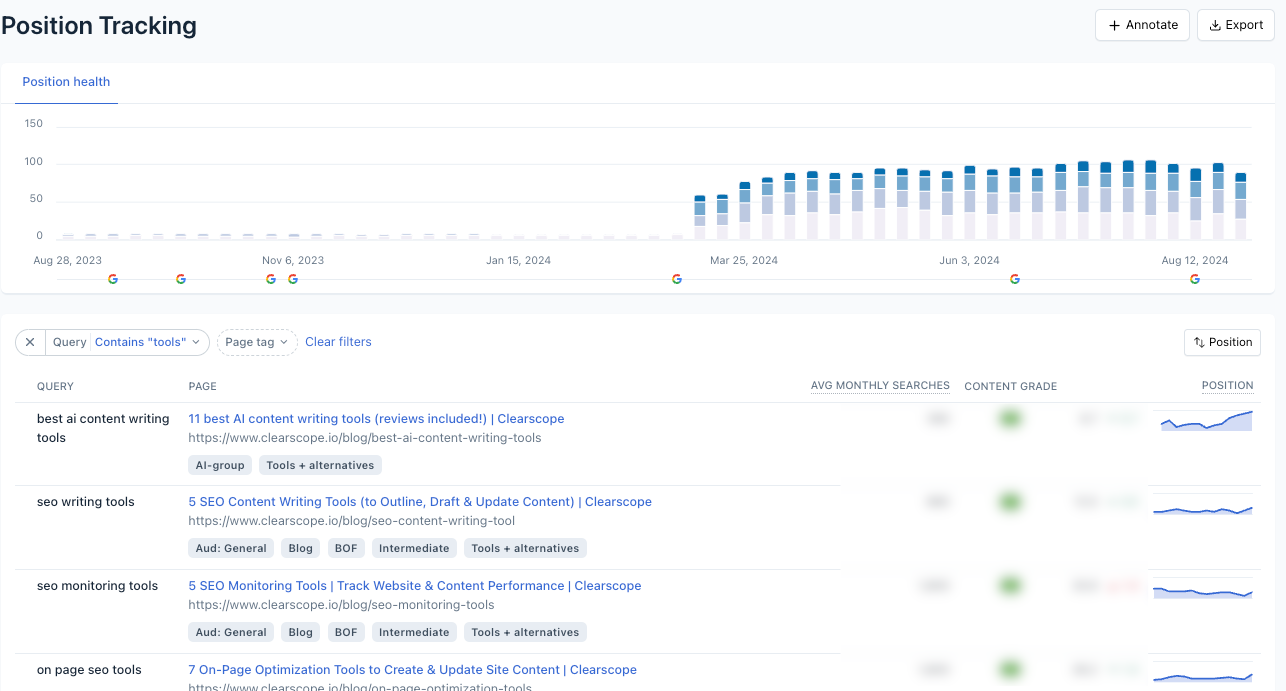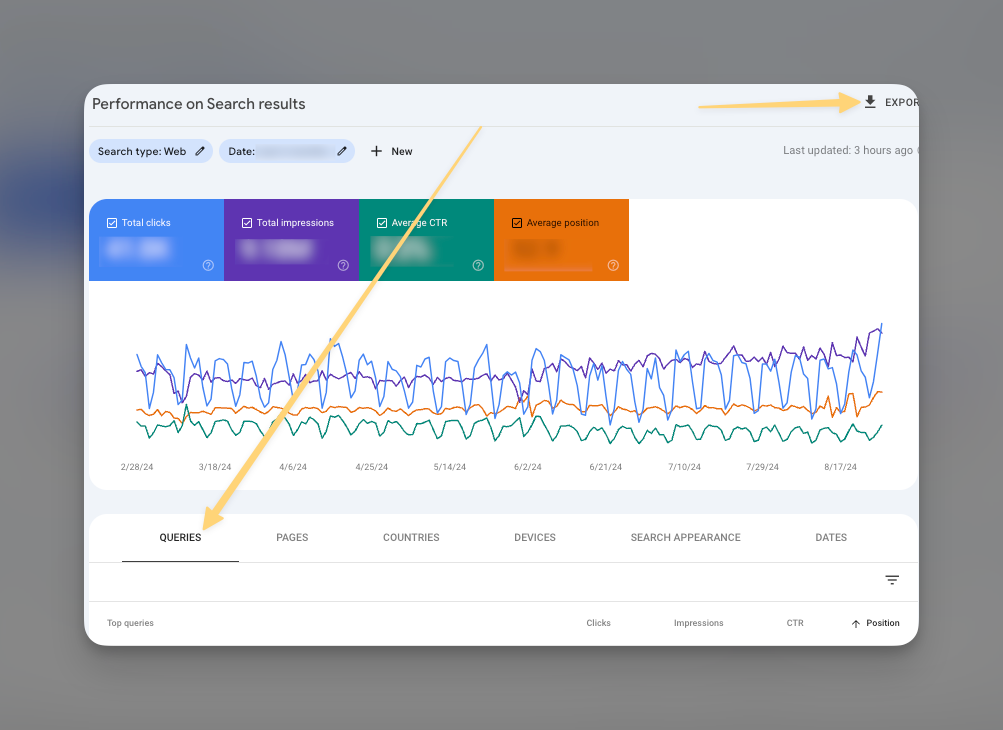What Is Rank Tracking and Why It Matters for SEO
Topic: SEO
Published:
Written by: Bernard Huang
TL;DR: What is rank tracking?
Rank tracking is the practice of monitoring a website's position in search engine results pages (SERPs) for specific keywords.
It involves using tools to periodically check where a website ranks for target keywords and monitoring changes over time.
Rank tracking allows you to keep an eye on your website's current rankings and adjust your approach to ensure you're always meeting your target audience's needs.
By using an SEO monitoring platform and rank tracking software—such as Clearscope—digital marketers can track the performance of their targeted keywords, see how their website ranks against competitors, and optimize their search engineoptimization (SEO) strategies and site content accordingly.

Clearscope's Position Tracking feature gives you a streamlined way to view insights into keyword rankings for your Content Inventory.
The basics of rank tracking
Rank tracking tools are essential for anyone serious about SEO. You truly can’t rank track without using a few SEO tools—some of which are completely free.
These tools provide valuable insights into where your web pages rank for specific keywords across different search engines.
Keyword rank tracking checkers allow you to:
Closely monitor fluctuations in keyword positions, view historical data, and understand how SERP features, like featured snippets, impact your search engine rankings.
Clearly identify which keywords need more attention or which ones might require new content to boost visibility.
Popular rank tracker tools such as SEMrush, Ahrefs, and Google Search Console (GSC) offer advanced functionality to track rankings, giving you a comprehensive view of your SEO efforts.
And platforms like Clearscope not only give you insight in to position tracking across your content library, but also equip you to monitor and optimize your content to better meet search intent.
Whether you're targeting local SEO, focusing on long-tail keywords, or optimizing for competitive search terms, these tools help you stay informed and agile in the ever-changing digital landscape.
LEARN MORE: How to optimize for search intent
Why rank tracking matters for SEO
Importance in SEO strategy
Rank tracking is important because it can give you insights into effectiveness of your SEO strategy.
It helps you understand your keyword rankings and SERP positions, which directly impact your website performance and visibility on search engines like Google.
Higher page ranks can lead to increased organic traffic, which can drive conversions and improve ROI.
The better your average position or Google ranking for important keywords, the more likely you are to land on the first page of search results, where the majority of clicks happen.
By regularly tracking your keyword performance, you can optimize your SEO campaigns and content creation efforts.
This means adjusting your strategy based on what's working and what's not, ensuring that your website continues to perform well in search engine rankings. (Tracking this data can also help inform marketing actions across other channels, like social media.)
Measuring SEO efforts
Rank tracking is not just about keeping tabs on where your keywords stand; it's about measuring the effectiveness of your overall SEO efforts.
Your search rankings inform key SEOmetrics such as organic traffic, conversion rates, and the effectiveness of your optimization efforts.
By using rank tracking software, you can gain insights into how your website ranks compared to competitors, allowing you to perform competitor analysis and adjust your strategy to outperform them.
Additionally, tracking keyword rankings over time gives you a clear picture of how your SEO efforts translate into business results, making it easier to correlate your rankings with ROI and conversions.
The use of a rank tracker tool also ensures you’re aware of any drops in rankings that could signal issues needing immediate attention.
How does rank tracking work
Tools and techniques
Rank tracking involves using tools like SEMrush, Ahrefs, Clearscope, and Google Search Console to monitor keyword positions, competitors, and content health on SERPs.

You can view queries that your site receives organic traffic for in Google Search Console (GSC) and export the data outside of the platform. You can also view data by page if needed.
Depending on the tool or platform you use, you can track fluctuations in keyword rankings, view historical data, and analyze the impact of SERP features on your rankings.
For those focused on granular details, rank tracking software provides the capability to monitor even slight changes in ranking positions for different keywords across multiple search engines.
With these tools, you can discover how specific keywords perform, monitor ranking positions, find new keywords to target, and receive real-time notifications of significant changes.
Interpreting rank tracking data
Understanding how to read and analyze rank tracking data is key to making informed decisions.
This is the ranking data you need to pay attention to:
Average position or organic search positions
Increase or decrease in SERP positions for keywords you rank for
Average monthly searches (or estimated search volume) for those keywords
What pages or URLs are ranking for which queries
Pages that rank for many high-intent queries
The average click-through rate (CTR) for ranking queries
Estimated SERP features your pages might rank for
Utilizing real-time data and notifications from these tools allows you to stay ahead of the curve, ensuring that your content maintains its top-ranking positions and continues to attract high-quality organic traffic.
Plus, interpreting this data correctly can help you understand how search queries evolve and what new content may be required to stay competitive.
Best practices for rank tracking
Setting up rank tracking for success
To effectively track rankings, start by identifying and tracking target keywords and relevant keywords that are important to your business.
It's also essential to monitor performance for targeted keywords based on their search intent and not just their volume.
If you have a local business, you’ll also need to monitor your local SEO optimization efforts by tracking local business rankings in Google Maps or hyper local keywords.
Incorporating a comprehensive list of keywords into your tracking software ensures you don't miss out on potential ranking opportunities. (But many SEO software platforms can and will do this automatically.)
Remember to focus on optimizing for the specific needs of your target audience, whether through creating new content, refreshing old content, or adjusting strategies based on your tracker tool's insights.
Rank tracking with your SEO tool stack
Integrating rank tracking with SEO tools like Google Analytics and Bing Webmaster Tools can provide a more comprehensive view of your SEO performance.
Combining rank tracking with keyword research, content marketing, and link-building strategies allows you to track keyword performance over time, optimize your SEO efforts, and drive better results.
If you’re an agency that’s managing multiple clients, integrating API and white-label solutions with your rank tracking tools can enhance the functionality and reporting capabilities.
These integrations can streamline the process of tracking keyword rankings and generating reports, making it easier to communicate results with stakeholders.
Common mistakes to avoid
When tracking rankings, avoid these common mistakes:
Focusing solely on search volume without considering search intent.
Overlooking long-tail keywords, which can drive valuable traffic despite their lower search volume.
Misinterpreting search volume and click-through rates (CTR), leading to missed opportunities.
Neglecting competitor rankings and failing to monitor changes in your SEO strategy.
Using the wrong rank tracker tool or not fully utilizing the software’s functionality, which can result in incomplete data and misguided SEO efforts.
Not ensuring that the tool matches your specific needs, whether focusing on local SEO, granular keyword tracking, or broad market trends.
LEARN MORE: How to find your goldilocks keywords with search intent analysis
Additional considerations for rank tracking
Rank tracking and future SEO trends
As SEO continues to evolve, staying ahead of future trends is essential.
Adapting to the latest algorithm updates and changes in searcher behavior is critical for maintaining high rankings.
The growing importance of tracking SERP features—like AI-generated Overviews, citations, and featured snippets—cannot be overstated, as these elements increasingly influence how search results are displayed and clicked.
Moreover, understanding how social media searches influence search engine rankings and what search queries are used where will become increasingly important as the lines between platforms blur.
Staying informed about these trends will ensure your SEO strategy remains effective and relevant in the years to come.
Common questions about rank tracking
Q: Why is it important to track your website’s ranking over time?
A: Tracking your website's ranking over time is crucial for understanding how well your SEO efforts are performing. It helps you identify trends, measure the impact of optimization efforts, and make data-driven decisions to improve your rankings and drive more organic traffic. Continuous monitoring of your current rankings also allows you to react quickly to changes and maintain strong visibility.
Q: How does rank tracking influence SEO strategies?
A: By understanding how your keywords rank, you can optimize your content, adjust your strategy, and stay competitive in your industry. A healthy SEO rank isn’t just about content tweaks and backlinks, and tracking results and observing patters can help inform your actions to stay ahead of competitors.
Additional resources
We analyzed 4 million Google Search Results: Here's What We Learned AboutOrganic Click Through Rate from the Backlinko Blog
Get started with Search Console from Google Search Central
How To Measure and Predict ROI for Your Content Marketing Strategy
Understanding how to calculate content marketing ROI is an essential step in tracking and communicating the effectiveness of your strategy.
Read moreSEO Content Tracking: How to Track Performance & SEO Scores
Our guide talks about the best metrics to measure for SEO content tracking — we explain the tools to use & how to use them so you can get started with ease.
Read moreWhat are the best content optimization tools?
In need of a content optimization tool? Check out our guide of the best content optimization tools on the market.
Read more